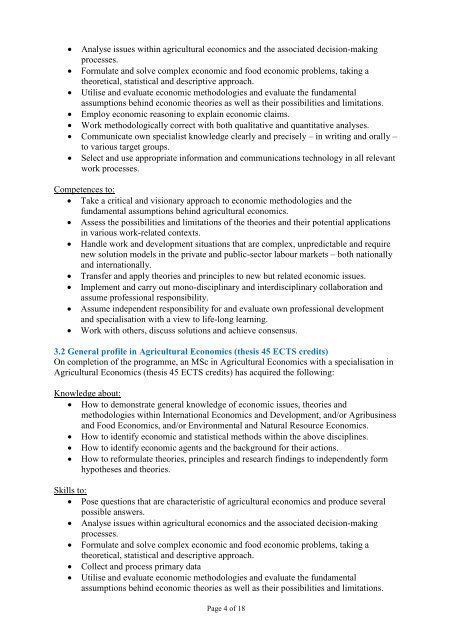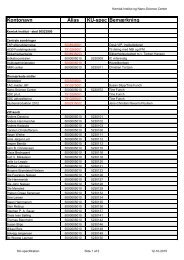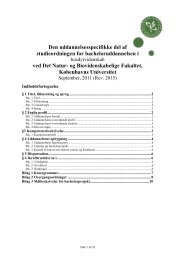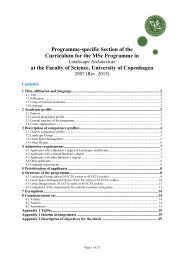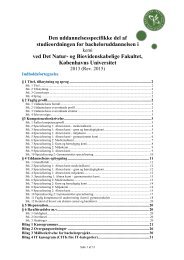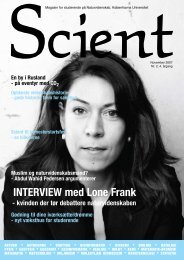Programme-specific Section of the Curriculum for the MSc ...
Programme-specific Section of the Curriculum for the MSc ...
Programme-specific Section of the Curriculum for the MSc ...
You also want an ePaper? Increase the reach of your titles
YUMPU automatically turns print PDFs into web optimized ePapers that Google loves.
Analyse issues within agricultural economics and <strong>the</strong> associated decision-making<br />
processes.<br />
Formulate and solve complex economic and food economic problems, taking a<br />
<strong>the</strong>oretical, statistical and descriptive approach.<br />
Utilise and evaluate economic methodologies and evaluate <strong>the</strong> fundamental<br />
assumptions behind economic <strong>the</strong>ories as well as <strong>the</strong>ir possibilities and limitations.<br />
Employ economic reasoning to explain economic claims.<br />
Work methodologically correct with both qualitative and quantitative analyses.<br />
Communicate own specialist knowledge clearly and precisely – in writing and orally –<br />
to various target groups.<br />
Select and use appropriate in<strong>for</strong>mation and communications technology in all relevant<br />
work processes.<br />
Competences to:<br />
Take a critical and visionary approach to economic methodologies and <strong>the</strong><br />
fundamental assumptions behind agricultural economics.<br />
Assess <strong>the</strong> possibilities and limitations <strong>of</strong> <strong>the</strong> <strong>the</strong>ories and <strong>the</strong>ir potential applications<br />
in various work-related contexts.<br />
Handle work and development situations that are complex, unpredictable and require<br />
new solution models in <strong>the</strong> private and public-sector labour markets – both nationally<br />
and internationally.<br />
Transfer and apply <strong>the</strong>ories and principles to new but related economic issues.<br />
Implement and carry out mono-disciplinary and interdisciplinary collaboration and<br />
assume pr<strong>of</strong>essional responsibility.<br />
Assume independent responsibility <strong>for</strong> and evaluate own pr<strong>of</strong>essional development<br />
and specialisation with a view to life-long learning.<br />
Work with o<strong>the</strong>rs, discuss solutions and achieve consensus.<br />
3.2 General pr<strong>of</strong>ile in Agricultural Economics (<strong>the</strong>sis 45 ECTS credits)<br />
On completion <strong>of</strong> <strong>the</strong> programme, an <strong>MSc</strong> in Agricultural Economics with a specialisation in<br />
Agricultural Economics (<strong>the</strong>sis 45 ECTS credits) has acquired <strong>the</strong> following:<br />
Knowledge about:<br />
How to demonstrate general knowledge <strong>of</strong> economic issues, <strong>the</strong>ories and<br />
methodologies within International Economics and Development, and/or Agribusiness<br />
and Food Economics, and/or Environmental and Natural Resource Economics.<br />
How to identify economic and statistical methods within <strong>the</strong> above disciplines.<br />
How to identify economic agents and <strong>the</strong> background <strong>for</strong> <strong>the</strong>ir actions.<br />
How to re<strong>for</strong>mulate <strong>the</strong>ories, principles and research findings to independently <strong>for</strong>m<br />
hypo<strong>the</strong>ses and <strong>the</strong>ories.<br />
Skills to:<br />
Pose questions that are characteristic <strong>of</strong> agricultural economics and produce several<br />
possible answers.<br />
Analyse issues within agricultural economics and <strong>the</strong> associated decision-making<br />
processes.<br />
Formulate and solve complex economic and food economic problems, taking a<br />
<strong>the</strong>oretical, statistical and descriptive approach.<br />
Collect and process primary data<br />
Utilise and evaluate economic methodologies and evaluate <strong>the</strong> fundamental<br />
assumptions behind economic <strong>the</strong>ories as well as <strong>the</strong>ir possibilities and limitations.<br />
Page 4 <strong>of</strong> 18


